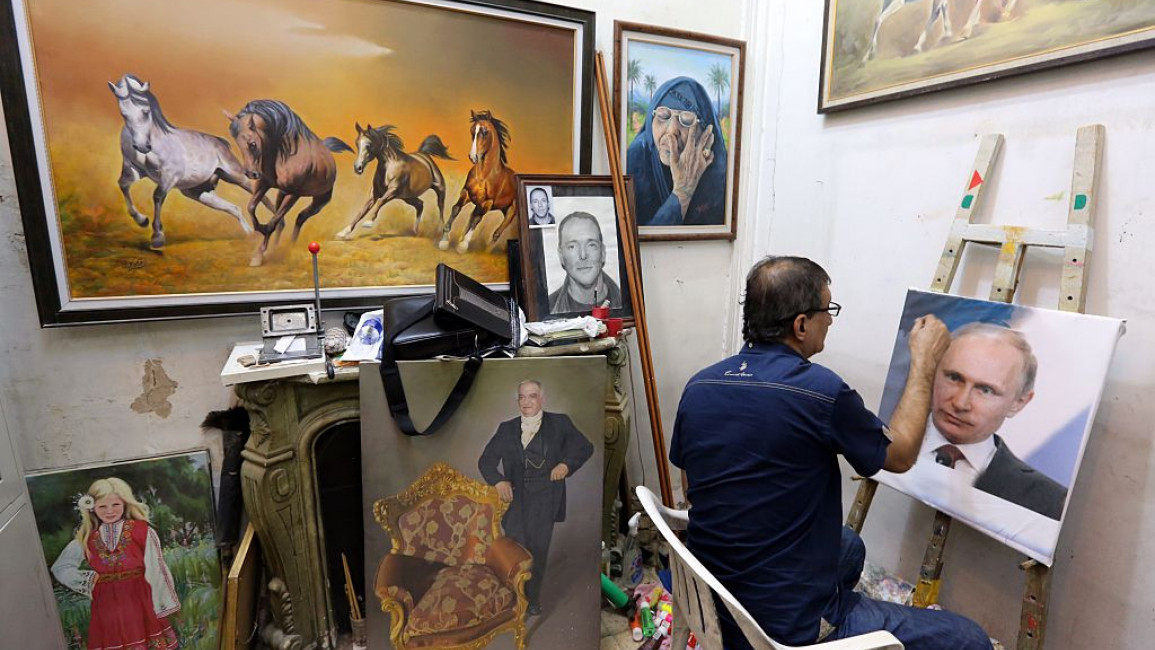Controversial pro-Putin poster removed in Baghdad
SULEYMANIYYAH (Iraqi Kurdistan Region) - At least one big billboard in support of Russian President Vladimir Putin was reportedly removed by Iraqi armed forces late on Wednesday, hours after Iraq abstained from voting on a UN General Assembly US-led resolution against the Russian invasion of Ukraine.
“We support Russia,” read the message on a number of large portraits of Putin, which were signed by “the friends of the president”.
Kurdistan Democratic Party (KDP)-linked Iraqi Kurdish TV Rudaw broadcast footage from their correspondent in Baghdad, saying that the poster had been put up in the Al-Jadriya neighbourhood, next to a base belonging to pro-Iranian Iraqi militia Asaib Ahl al-Haq.
The billboard was soon removed by Iraqi armed forces, reportedly following an order from Baghdad’s Operations Command. Footage circulated on social media shows a group of unidentified men tearing down the poster, with at least one of them wearing an army uniform.
'#Friends of the president' was the most trending hashtag on Twitter in Iraq over the past few days, with Iraqi social media users divided between supporters of Russia and Ukraine.
“We are all Putin and we are all Russians against those who invaded our country in 2003,” Iraqi citizen Hassan Al-Zaidi wrote on Twitter. Zaidi seems to be supportive of former Iraqi PM Nouri al-Maliki, a close ally of Tehran.
"We are not a party in the conflict between Russia and Ukraine or in any other war," Iraqi blogger Zein Al Tamim wrote on Twitter. "We have had enough of conflicts.” Tamim appears to be supportive of Muqtada al-Sadr, a Shi'a political and religious leader who has been at times critical of Iran.
Ayad Al-Rawi, another Iraqi Twitter user posted a video that shows a group of Iraqi youths as they tear apart one of Putin’s pictures in Baghdad.
The Russian embassy in Baghdad shared the photo of one of the billboards on its official Twitter page, with the caption in Russian reading: “On the streets of Baghdad”.
The official Arabic page of the Russian foreign ministry on Twitter also posted Putin’s photo with the captions “On the streets of Baghdad”, “Russia is righteous” and “We stay with Russia.”
Many social media users accused pro-Iran Shiite factions of being behind the billboards, but a well-connected source from the Iraqi ruling elites, who spoke on condition of anonymity, told The New Arab that “the Cultural Attaché of the Russian Embassy in Baghdad has paid some Iraqis to print the pictures.”
The New Arab contacted the Russian embassy in Baghdad via email but they were not available to comment by the time of publication.
The New Arab also contacted Mohanad al-Eqabi, media director of the Iraqi Popular Mobilization Forces (PMF), and Mahmoud Hayani, an MP from the Fatah Alliance, but neither of them responded by the time of publication. The Fatah Alliance is the political wing of the PMF, an umbrella group for militias that are on the government's payroll and closely linked with Iran.
The well-connected source ruled out that pro-Iranian militias had affixed the posters, arguing that, had they been responsible, “they would have definitely protected them and nobody could have removed them.”
Iraq has close economic and military ties with Russia as a number of Russian giant oil companies, including Gazprom Neft and Lukoil, are active in both the Kurdistan Region and southern Iraq.
Iraq is also a major importer of wheat and arms from Russia.
According to documents seen by Iraqi Kurdish broadcaster Rudaw, the Iraqi Central Bank currently favours a suspension of business and financial transactions with Russia, in abidance with recently approved US sanctions.
Iraq already benefits from a waiver on US sanctions against Iran, which allows Baghdad to purchase electricity from Tehran and cover part of its chronic power shortages. The waiver was reportedly renewed for another 120 days in late November, according to official documents seen by conservative US publication The Washington Free Beacon.



